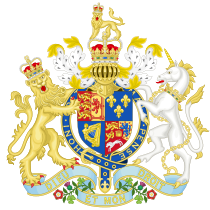Anne Vaux (c. 1562 – in or after 1637) was a wealthy Catholic recusant
One of the Acts of Parliament collectively known as the Elizabethan Religious Settlement. It introduced a Common Book of Prayer, and obliged everyone to attend their parish church every Sunday and on holy days. Those who refused were known as recusants.. She was a relative of Francis Tresham, one of the conspirators in the Gunpowder PlotAttempt in 1605 to assassinate King James I and re-establish a Catholic monarchy by blowing up the House of Lords. of 1605 to blow up the Houses of Parliament, but had no direct involvement in the plot herself. She was however devoted to the Jesuit priest Henry GarnetEnglish Jesuit priest executed for his complicity in the Gunpowder Plot of 1605., who was executed for his part in the plot, and attempted unsuccessfully to conceal him from the authorities. She was the third daughter of William Vaux, 3rd Baron Vaux of Harrowden (1535–1595) and his first wife, Elizabeth, daughter of John Beaumont of Grace Dieu, Leicester.[1] She and her sister Eleanor Brooksby supported Catholic priests by renting houses in which priests could convene safely. Among them was White Webbs in Enfield Chase, which was visited by several of the Gunpowder Plotters.
Both Anne and Tresham have been suspected of being the author of an anonymous letter to William Parker, 4th Baron Monteagle, warning him to avoid Parliament on 5 November 1605, the day that the Gunpowder Plotters intended to blow it up.[1] The letter, which Monteagle gave to Robert Cecil, 1st Earl of Salisbury, was instrumental in foiling the plot. The identity of the letter’s author has never been conclusively determined. The theory that it was written by Anne is based largely on “perceived similarities” between her handwriting and that used in the letter.[1]
Anne suspected the existence of the Gunpowder Plot, but she played no direct role in it. She was arrested shortly after its discovery, but was released on a bond put up by Lewis Pickering. After her release, she tried unsuccessfully to hide Garnet at the home of Thomas Abington at Hindlip, Worcestershire, but he was discovered and arrested on 25 January. Anne travelled to London, where Garnet was incarcerated in the Tower of London, and attempted to communicate with him via concealed messages on letters given to Garnet’s gaoler. The messages were written in orange juice; historian Anstruther argues that their illegibility indicates that Anne was near-sighted and unaccustomed to writing. The messages were forwarded to Salisbury, and Anne was arrested in March 1606. Under interrogation, she proclaimed herself innocent of treason, but admitted to receiving conspirators at her houses; she was released in August.[1]
Later life
Anne moved to her sister Eleanor’s family estate in Leicestershire, where she was convicted of recusancy
One of the Acts of Parliament collectively known as the Elizabethan Religious Settlement. It introduced a Common Book of Prayer, and obliged everyone to attend their parish church every Sunday and on holy days. Those who refused were known as recusants. in 1625, and following her sister’s death moved to Stanley Grange, Derbyshire. She founded a school for boys from Catholic noble families, which the Protestant authorities tried to shut down in 1635. She died in 1637 or later.[1]
Media depictions
Anne Vaux was played by Helen Longworth in The Gunpowder Plot on BBC Radio 3, Carolyn Pickles in the BBC Radio 4 mini-series Gunpowder Women and by Liv Tyler in the BBC One series Gunpowder.
